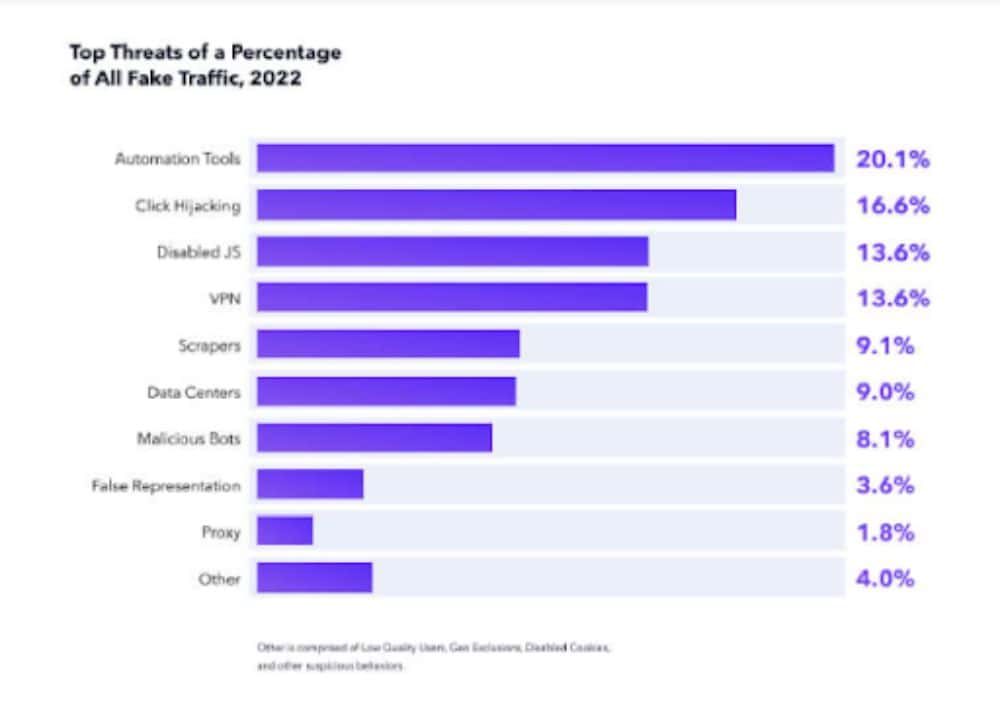Affiliate marketing has expanded to encompass various strategies, including brand ambassadors, affiliate networks, and influencers on platforms like TikTok and Instagram.
Affiliate marketing is a marketing strategy that connects businesses with networks of marketers and publishers.

According to a study by Influencer Marketing Hub, global spending on affiliate marketing is projected to reach $14.3 billion by 2023, with a further increase to $15.7 billion in 2024.
Affiliate marketing has the potential to significantly boost sales and brand recognition, but it is important to be aware of potential risks as well.
In light of the growing affiliate marketing industry, it is important to be aware of potential unethical affiliates and digital marketing scams that could impact your business. This article will discuss common affiliate marketing scams and provide tips for building secure partnerships.

What is an Affiliate Marketing Scam?
An affiliate marketing scam is defined as a scheme that improperly manipulates the affiliate marketing system to generate profits.
Scammers employ deceptive tactics to achieve their objectives, often harming unsuspecting customers, legitimate affiliates, and the reputation of the businesses they target. These unethical practices can include generating fraudulent clicks and leads and utilizing dishonest advertising methods.
Why are Scams on the Rise?
As affiliate marketing continues to expand, there is a growing tendency to seek passive income through fraudulent methods.
A study by CHEQ revealed that 17% of traffic from affiliate programs was determined to be fraudulent in 2022, resulting in an estimated $3.4 billion lost to ad fraud. This represents a significant increase from the 10% fraudulent traffic reported in 2020.
Marketers utilize affiliate programs throughout the customer journey.
83% targeted consumers during the discovery and awareness phase
79% during conversion or purchase
79% to create ongoing customer engagement
As this demand grows, people want to take a chunk.
The number of fake accounts on the internet is increasing. In just the fourth quarter of 2022, Facebook dealt with 1.3 billion fake accounts. Platforms like Instagram, TikTok, and PayPal also face similar issues with scammers taking advantage of the anonymity these platforms provide.
Scammers often create fake product review sites where they pose as satisfied customers, even though they have never used the products. This deceptive practice extends beyond just product reviews, as automation and AI technology allow bots to quickly complete a variety of tasks, such as making purchases and filling out forms.
The prevalence of affiliate scams in the online shopping ecosystem is not unexpected, given the widespread use of e-commerce in our daily lives. Despite the slowdown in the pandemic e-commerce boom, the online shopping industry continues to expand, resulting in increased opportunities for monetary gain and potential greed.
How Do Affiliate Scams Hurt Merchants?
Scammers engaging in fraudulent activities can result in financial burdens for merchants. Illegitimate affiliate commissions reduce the profitability of affiliate marketing programs and may lead to lower overall return on investment.
Scams can harm an advertiser’s reputation as well. Customers who inadvertently buy through scammer’s affiliate links may have poor experiences with the product or service, resulting in dissatisfaction, negative feedback, and a loss of trust. This impacts credibility and customer loyalty.
The presence of scams in an affiliate marketing program can damage trust between legitimate affiliates and brands, impacting the industry as a whole.
When legitimate affiliates witness scammers exploiting the system to earn commissions through unethical practices, they may feel devalued and raise concerns about the integrity of the program, leading to a loss of trust that hinders the ability to attract and retain high-quality affiliates.
Affiliate Marketing Scams to Watch Out for
Here are some common affiliate marketing scams to be aware of that can hinder your efforts.
Google Ad Hijacking
Google ad hijacking is a tactic used by scammers to create fake ads at the top of Google search results, resembling a company’s ads, in order to steal branded traffic.
Businesses should be cautious of fraudulent ads that offer software services at a lower cost or with additional perks, as they may lead to clicking on fake ads instead of accessing the official website.
URL Hijacking
URL hijacking, also referred to as typosquatting, is a form of affiliate marketing fraud in which scammers establish websites with domain names similar to legitimate affiliate sites or popular brands. This tactic aims to mislead visitors into clicking on the scammer’s affiliate links, generating commissions for any purchases made through those misleading links.
For example, scammers may attempt to target HubSpot’s URL by creating a website with a domain name like “hubsp0t.com” or other slight misspellings or variations.
Visitors who land on the fake website created through URL hijacking will be redirected to the legitimate business website by the scammers.
This redirect ensures that visitors reach their intended destination while scammers earn commissions from an affiliate partner through deceptive tactics claiming credit for the referral.
Fraudulent Transactions
Transaction fraud is a common form of identity theft where stolen credit cards or online accounts are used to make unauthorized purchases. Credit card theft ranks as the second most prevalent type of identity theft in the US.
When a legitimate cardholder disputes an unauthorized purchase, you may be left with chargebacks and associated fees. Additionally, payment processors may impose penalties for processing fraudulent transactions.
Your affiliate partner may face consequences if they unknowingly promote a fraudulent transaction, such as being held responsible and potentially removed from the program.
Fraudulent Leads
Fraudulent leads in affiliate marketing are fake or illegitimate leads created to deceive and earn commissions dishonestly. Scammers may employ deceptive tactics like fake form submissions or duplicate leads to make it seem like genuine customers are interested in a product or service.
Some scammers may manipulate lead capture forms to give the impression of multiple interested customers, but these leads lack true value as they do not reflect genuine prospects.
Deceptive practices can have negative effects on marketing efforts, resources, and product perception.
Click Spam
Click spam is a deceptive practice in which scammers generate fraudulent clicks on affiliate links to artificially boost traffic and earn commissions.
Scammers use bots to simulate human clicks on affiliate links, creating a high volume of clicks in a short period that can make it challenging to distinguish between legitimate and fraudulent traffic.
Click fraud is a significant issue, with organized groups committing fraud and costing advertisers a substantial amount of money.
Fake Products

Fake products in affiliate marketing involve the promotion of non-existent goods through deceptive advertising, leading customers to make purchases based on false information.
False representation is a significant source of fake traffic.
Scammers have been known to create fake websites resembling legitimate online stores or popular brands in order to deceive unsuspecting customers with enticing offers and discounts.
Users may unwittingly provide personal and financial information to scammers when they interact with fraudulent ads or web pages, without receiving any products in return.
Spoof Traffic
Spoof traffic occurs when scammers create false or altered website traffic to give the appearance of genuine user activity such as visiting websites, clicking on affiliate links, or interacting with content.
Link farms are interconnected websites created to increase the number of backlinks for other sites, often used for manipulating search engine rankings or generating fake traffic.
Scammers utilize link farms to enhance the credibility and popularity of their fraudulent websites or affiliate links. By artificially increasing the number of inbound links to their content, they create a false sense of legitimacy to both search engines and users.
Cookie Stuffing
Cookie stuffing involves placing affiliate cookies on users’ devices without their consent, allowing scammers to track their online activities and potentially attribute future purchases to their affiliate account.
An affiliate cookie placed on your device by a scammer could lead to them earning a commission on a purchase you make on a different website.
In 2013, eBay’s super-affiliates, Shawn Hogan and Brian Dunning, were convicted of fraud for a cookie-stuffing scheme. Hogan received a five-month federal prison sentence for allegedly defrauding eBay of $28 million in online marketing fees.
eBay’s online sting operation, known as “Trip Wire,” uncovered fraudulent traffic from Hogan and resulted in the conviction of Dunning, eBay’s second largest affiliate marketer.
Website Cloning
Website cloning involves scammers creating fake websites that closely resemble legitimate ones, including design, content, and web addresses, in order to trick users.
Consider the scenario of someone replicating your website, making subtle alterations, and assuming your identity.
Cloned websites are designed to deceive visitors and obtain personal information, including login credentials and credit card details.
Website cloning presents a significant risk to both businesses and customers, as individuals may inadvertently input sensitive information under the impression they are on the authentic website. This poses a threat to security and may lead to identity theft and financial repercussions.
Fake Referral

In fraudulent schemes, individuals may impersonate satisfied customers or well-known influencers to promote products or services they are not familiar with. This is done to deceive individuals into thinking they are generating valuable affiliate traffic and sales.
These referrals are deceptive tactics used by scammers to earn dishonest commissions. They create fake accounts posing as satisfied customers to leave positive reviews and refer others in order to claim rewards.
Signs of Affiliate Marketing Scams
There are common characteristics that most scams share. It is important to be aware of red flags to avoid falling victim to them.
High Traffic Numbers But Low Conversions
A common indicator of scams is a high volume of affiliate traffic resulting in disproportionately low customer conversion rates, akin to a busy store with many window shoppers but few actual purchasers.
High traffic numbers are considered vanity metrics unless they result in a substantial number of conversions or sales, in which case they should be a cause for concern.
If an affiliate drives a significant amount of visitors to your website but the conversion rate is less than 0.5%, resulting in only a small number of sales, it may indicate potential fraudulent activity.
Affiliates tend have higher conversion rates when their traffic is targeted and relevant. The low conversion rate in this case could indicate artificial inflation of traffic or irrelevant sources.
High Number of Refunds or Chargebacks
Legitimate affiliates focus on promoting quality products or services that address customer needs. This results in low refund rates for their referrals, showcasing customer satisfaction and confidence in the offerings.
Scammers may use false promises to deceive customers into making purchases, leading to potential refund requests or chargebacks when buyers realize they were misled.
A high number of refunds may warrant further investigation into the affiliate’s methods to ensure their legitimacy.
Lots of IP Addresses Coming from One Location
Traffic often originates from a variety of locations reflecting the broad audience affiliates target. However, scammers may attempt to mask their deception by using proxy servers or VPNs to show multiple unique IP addresses all coming from the same location.
If an affiliate claims traffic is coming from multiple countries but analysis shows that most activities are concentrated in one city or region, it could indicate potential manipulation of traffic data.
This practice involves manipulating tracking systems to create false impressions of organic and widespread traffic, leading networks to believe the traffic is genuine when in reality, the traffic is artificially generated and does not reflect real user interest or engagement.
An Affiliate Has Disproportionately High Numbers
The performance of affiliates can differ based on marketing strategies, audience reach, and niche specialization. If one affiliate consistently outperforms the others in terms of sales, clicks, or conversions, it warrants further investigation.
While it is possible to achieve extraordinary results in legitimate cases, a significant difference in sales performance among affiliates may raise concerns about potential fraudulent practices or scamming.
Scammers may engage in manipulating data or using deceptive tactics such as cookie stuffing, fake referrals, or spoof traffic to artificially inflate their numbers and earn commissions.
Leads Don’t Know You

One potential indicator that an affiliate could be engaging in fraudulent activity is when the leads you receive do not have any awareness of your brand, products, or services, despite supposedly coming from your affiliate.
This discrepancy often arises from questionable affiliate practices, such as sending unsolicited emails or driving traffic from irrelevant sources. These tactics can diminish the quality of leads and negatively impact your brand’s reputation.
An effective affiliate program involves a mutually beneficial relationship where the affiliate directs relevant traffic, consisting of leads with a good understanding of your offerings, towards your site. Failure in this aspect could indicate potential issues with the legitimacy of your affiliate partner.
For instance, if you are a B2B software company that focuses on CRM solutions, a legitimate affiliate will send you leads from relevant industries that have shown interest in CRM software. However, receiving leads from unrelated sectors such as fitness or agriculture, who are unfamiliar with your business, could indicate a possible affiliate marketing scam.
How to Avoid Affiliate Marketing Scams
Work With an Experienced Affiliate Marketing Agency
A reputable agency provides expertise, extensive data, and valuable connections, guaranteeing the success and credibility of your affiliate marketing program.
Gen3 is an affiliate marketing agency with a strong track record of successful campaigns and a focus on combating fraud. With extensive experience and a range of case studies, they have developed effective methods for detecting and preventing fraudulent activities.
Gen3 has extensive experience working with many companies and has developed a deep understanding of common fraud tactics and effective ways to combat them. From false clicks to counterfeit leads, Gen3 has encountered and learned to recognize these deceptive practices through hands-on experience.
Implement a Fraud Mitigation Plan
Implementing a fraud mitigation plan is a methodical approach to safeguard against affiliate marketing scams. It detects and prevents fraudulent behavior effectively.
It is important to be aware of the types of fraud commonly seen in affiliate marketing in order to educate your team and effectively identify potential threats.
Establish clear and specific rules for your affiliate program, including guidelines on acceptable traffic sources, lead generation methods, and reporting requirements. Ensure that all affiliates are aware of these rules and consistently enforce them.
Utilize technology-driven solutions for fraud detection, such as tools that can detect suspicious activities like multiple clicks from a single IP address or sudden increases in traffic. It is recommended to integrate these tools into your affiliate marketing platform for immediate fraud detection.
It is important to regularly audit your affiliate partners and assess the health of your affiliate program. This involves checking their traffic sources, analyzing the leads they generate, and evaluating their overall performance. Conducting an audit will help ensure that your affiliates are in compliance with your rules and not engaging in fraudulent practices.
A thorough fraud mitigation plan helps businesses take proactive measures against affiliate marketing scams, ultimately saving time, money, and avoiding potential reputational harm.
Clearly Define Terms and Conditions
The terms and conditions act as guidelines for affiliates, detailing acceptable and unacceptable behavior in the program.
Begin by outlining the criteria for a qualified lead or sale. Clearly state the required actions that an affiliate must drive in order to be eligible for a commission. Clarify whether a visitor must click through an affiliate’s link or complete a purchase to qualify.
Payment terms should be outlined clearly, specifying when and how affiliates will receive payment. It is advisable to set a minimum payout threshold and detail the timeframe for payouts.
The prohibited methods and practices should be clearly identified, including spamming and any other fraudulent techniques used to drive traffic from unauthorized sources. It is essential to have a comprehensive list to ensure all potential violations are covered.
Consequences for not following these terms and implementing fraudulent methods may range from withholding payment to potential expulsion from the program. These clear consequences aim to discourage affiliates from engaging in unethical practices.
It is important to retain the flexibility to adjust terms and conditions as needed in response to changes in the affiliate marketing landscape.
Clear terms and conditions help to establish expectations and promote transparency in affiliate marketing programs, reducing the risk of scams and maintaining program integrity.
Cloak and Monitor Affiliate Links
Link cloaking is a method used to hide and shorten affiliate links, improving their appearance and security. There are different tools available for this purpose, offering features like automatic link shortening and customization options.
After cloaking your links, it is important to monitor them regularly. This allows you track the traffic source and click-through rates of your affiliate links. By doing this, you can determine which affiliates are generating legitimate leads and who may be engaging in suspicious activities. For example, if an affiliate’s link starts receiving a significant increase in traffic, it could indicate fraudulent activity like click spamming.
Monitoring your links is essential for evaluating the overall performance of your affiliate program. It provides valuable insights into the effectiveness of different affiliates, as well as the popularity of various products or services.
Protect Yourself With a Partner That Can Deliver
Established and trustworthy affiliate marketing agencies, like Gen3 Marketing, can help maintain the integrity of your program and support in achieving your goals through ethical marketing practices.
Our team has access to successful campaigns and top affiliates to help maximize your program’s ROI. Additionally, we offer personalized support and guidance from our experienced team throughout the process.
Gen3 Marketing can help take your affiliate program to the next level. Contact us today to learn how we can help increase conversions, optimize performance, and protect against affiliate marketing fraud.
Conclusion
In conclusion, while affiliate marketing can be a beneficial method for brands to boost sales, it is important to be aware of the risks of fraud. Dishonest individuals may exploit the affiliate marketing concept to deceive businesses and earn illegitimate commissions. Therefore, it is essential for companies to take preventive measures to protect themselves, such as thoroughly vetting potential affiliate partners and monitoring their actions closely.
Businesses can decrease the risk of being targeted by affiliate marketing scams by staying vigilant and informed.
Frequently Asked Questions
Is affiliate marketing real or fake?
Affiliate marketing is a business arrangement where individuals receive compensation for promoting a brand’s products.
Is affiliate marketing a pyramid scheme?
Affiliate marketing is a legitimate form of advertising where affiliates earn compensation for generating leads or sales.
Is affiliate marketing illegal?
Affiliate marketing is a legal form of digital marketing, however, some individuals may misuse it to promote illegal activities like fraud.
What exactly is affiliate fraud?
Affiliate marketing fraud involves individuals using deceptive tactics such as cookie stuffing, website cloning, typosquatting, generating fake leads, and employing bot traffic to fraudulently obtain affiliate commissions.





